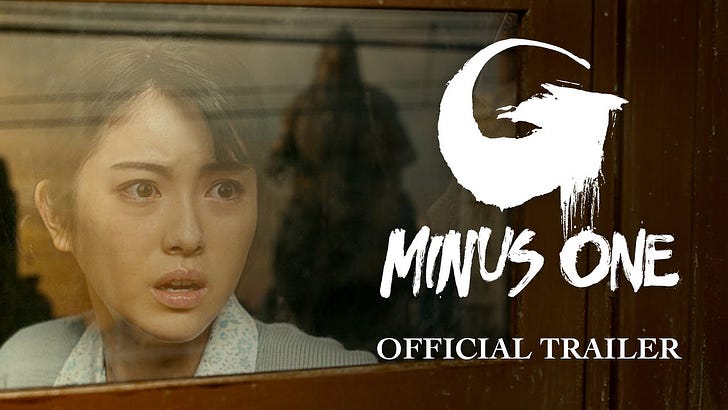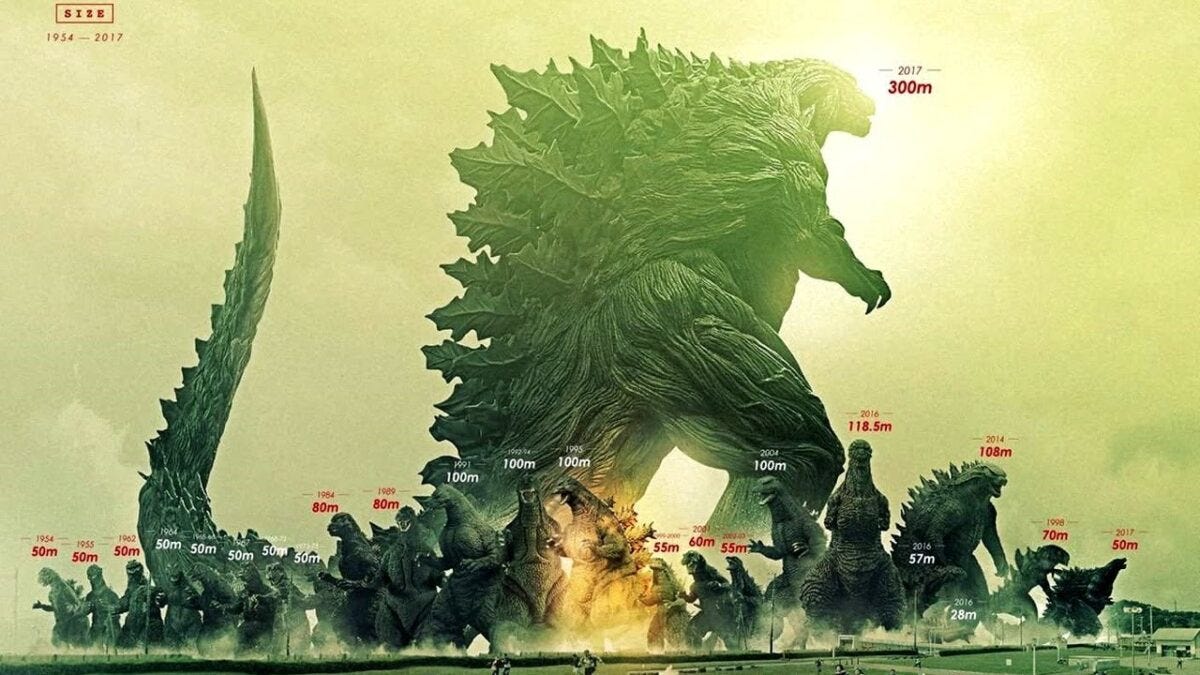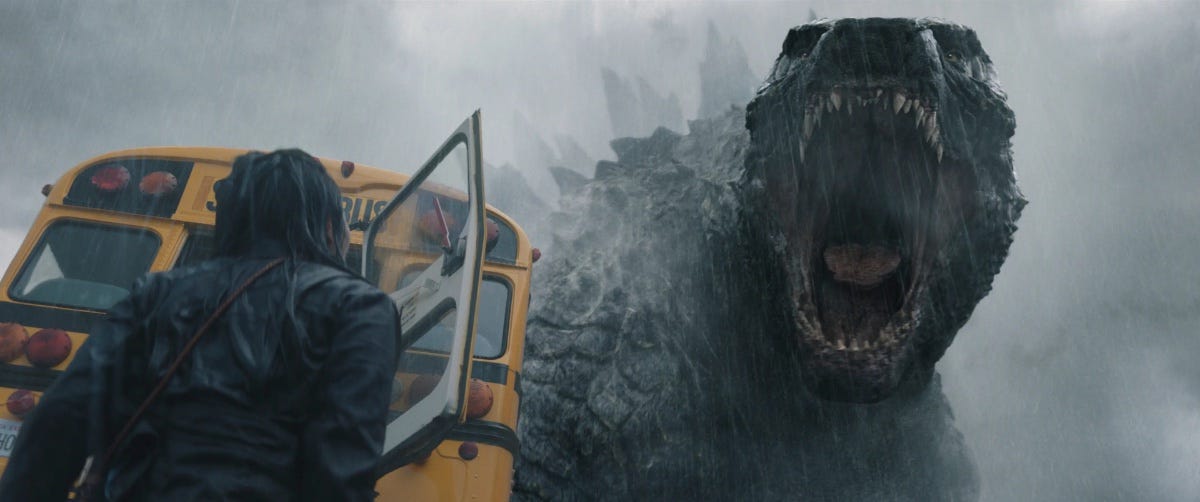A couple of weeks ago, I was hanging out in Tokyo and realized I hadn’t seen the new Godzilla Minus One film yet. So I headed to the best movie theatre in the universe to take in a new Godzilla movie, the Toho Cinema in Kabuki-cho, to check it out. And it was…nothing short of glorious. Keep reading to hear my thoughts on Japan’s most famous monster!
Godzilla: Minus One is an Instant Masterpiece
In the waning weeks of the War in the Pacific, fighter pilot Koichi Shikishima lands his plane on a remote island occupied by Japanese soldiers. He had been ordered to die in a kamikaze attack — known as 特攻 tokukou or “special attack” in Japanese — against U.S. warships, but his fear of dying caused him to feign technical troubles with his plane instead. That night, a giant creature attacks the soldiers, and Shikishima fails to fire his plane’s machine guns at the creature, again out of fear.
Shikishima returns to Japan to learn that his parents have been killed in the Allied bombing. Amid the shattered rubble of Tokyo, he begins supporting a woman named Noriko and a child named Akiko, who have both lost their families.
The American hydrogen bomb testing in the Bikini Atoll causes the monster to mutate and grow even larger. He begins attacking shipping and eventually makes landfall, laying waste to Ginza with the fiercest weapon yet seen in a Godzilla film. With the U.S. military unwilling to take action because of the new Cold War with the Soviets, can Japan find a way to destroy this terrible monster?
Godzilla: Minus One is the darkest and best re-envisioning of a sci-fi franchise I can think of. Taking the series back to its 1954 roots — before its roots, even — was a genius stroke. Showing people living in the immediate aftermath of the war was amazing for modern moviegoers to see.
The film was made by writer/director Takashi Yamazaki, who had wowed fans in the past with Always: Sunset on Third Street, a film set around the building of Tokyo Tower in the 1950s, and The Great War of Archimedes, a movie about designing the battleship Yamato. He spent his COVID lockdown polishing the script for this film, and it really shows in the final product.
What did I think of Hideaki Anno’s Ultraman reboot? Read my blog post here!
A Turning Point
I feel that Godzilla: Minus One provides an indication of brighter times to come for all of us, culturally. Over the past few years, it’s been quite frustrating to be a fan of Star Wars or the MCU because both have become terribly diluted, both from too much mediocre streaming content and from crappy writers forgetting that their job was to actually tell good stories.
Director Quentin Tarantino has said that the “cultural pendulum” regarding movie-making always swings one way and goes as far as it can but inevitably begins to swing back. So maybe the next decade will be a better one for movie fans!
What Goes Into a Good Godzilla Reboot?
The Godzilla film series has been rebooted many times. There have been the Showa Era films (1954-1975), the Heisei films of the ’90s, the standalone Tristar Godzilla in 1998, Hideaki Anno’s epic Shin Godzilla in 2014, and the currently-running MonsterVerse films made by Legendary Pictures. Godzilla has been well represented in anime form, with Gen Urobuchi’s well-written but poorly-animated CGI film trilogy and the most recent Godzilla Singular Point anime, which no one watched thanks to the “Netflix Jail” system.
To successfully re-envision a great monster series like this, we need certain core elements.
First, you have to start with the monster. How will you change Godzilla? The 1998 American film made him a weaker creature that could be killed with human weapons, but his incredible speed made it impossible to hit him. Hideaki Anno had a famous kabuki actor do the motion capture so he could give his monster superhuman grace. The Legendary reboot gave us “phat” Godzilla.
What’s the origin story of the monster? Is he a prehistoric creature mutated through man’s hubristic misuse of atomic energy? An ancient predator who feeds off of radiation? Did he start out as a natural creature (like an iguana) and get changed through nuclear testing?
How will the characters in the story react to the monster? Will they be predictable and flat, or will they have more complexity? Shin Godzilla was part monster movie and part political critique of the Japanese government’s mishandling of the 2011 Fukushima nuclear power disaster. (And the closest we’ll ever get to a live-action Evangelion film.)
My History with Godzilla
As I’ve written before, Godzilla was created when Toho producer Tomoyuki Tanaka was flying to Japan from Indonesia. He got the idea for a monster movie similar to 1953’s The Beast from 20,000 Fathoms. Something that could provide entertainment as well as social commentary on atomic weapons. Since stop-motion animation would be too expensive to produce, they went with “suitmation” (a man in a rubber suit). Godzilla would become Japan’s first important cultural export of the 20th century, though it would be far from the last.
I grew up in the early ’70s enthralled with the kaiju films and TV shows that were broadcast daily. I couldn’t get enough of Godzilla. Or Gamera, Johnny Socko and his Flying Robot and Ultraman. When I wasn’t watching Speed Racer, I was flipping channels looking for another monster movie to watch. I remember asking my mother why Japanese people’s lips didn’t match their voices when they talked.
Godzilla even made me into an anime blogger. When the 1998 American film was released in Japan, the reaction from customers to my post at the time made me realize I had a more important mission than selling JAV calendars and Hello Kitty “shoulder massager”: to bring Japan and the world closer through my posts. I marked my career as a blogger from the release of that film. Thanks, Big G!
Bonus: Make Sure to Watch Monarch: Legacy of Monsters on Apple+
If you’re a kaiju fan, make sure to check out Monarch: Legacy of Monsters on Apple+. It’s an amazing TV series following various characters in Legacy’s MonsterVerse. It’s best if you watch the five films in that series first, especially 2019’s Godzilla: King of the Monsters.
Thanks for reading this blog post about the Godzilla: Minus One film. What did you think of the movie, if you saw it? What kind of monster movie fan are you?
Also, be sure to follow J-List on these platforms!
Twitter/X, where Peter posts anime booba for you
Facebook, where we share memes and discuss anime
Instagram, where you can look at sterilized anime memes, because it’s Instagram
Discord, if you want to chat with other J-List customers of culture
Finally, check out J-List’s short video blogs on YouTube or TikTok!






